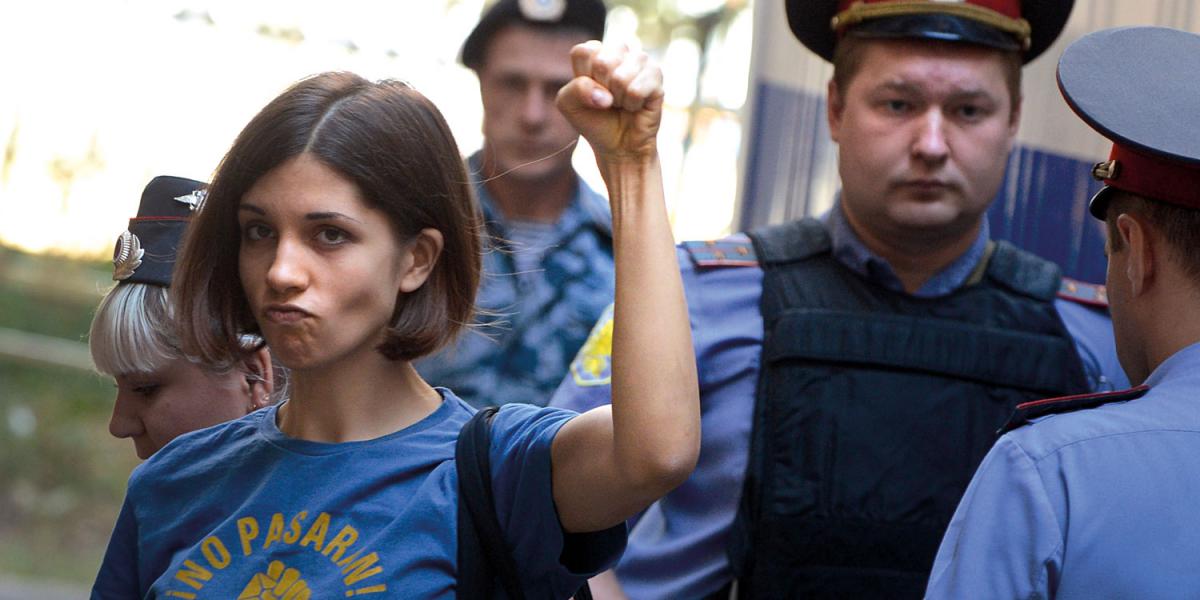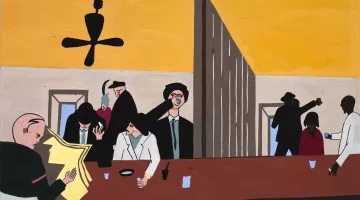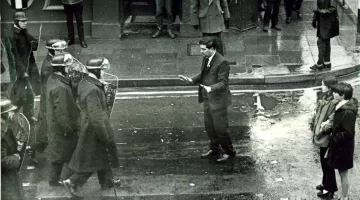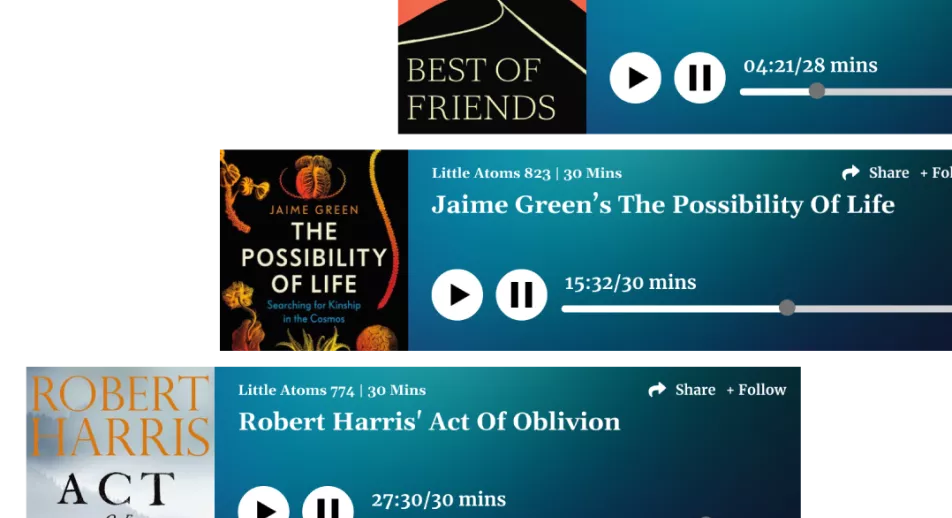A history of blasphemy: the revolutionary tradition of shouting in church
For radicals who see themselves as the scourge of hypocrites, heckling in churches is the ultimate act of rebellion

"Woe unto you, scribes and Pharisees, hypocrites! for ye compass sea and land to make one proselyte, and when he is made, ye make him twofold more the child of hell than yourselves.” (Matthew 23:15)
To the true believer, there is no greater crime than hypocrisy. And no greater perpetrator of that crime than organised religion. The template was set by Jesus himself, whose entire teaching hinged on the debasement of faith by religious hierarchy, most famously in his attack on the peddlers at the temple in Jerusalem:
“And Jesus went into the temple of God, and cast out all them that sold and bought in the temple, and overthrew the tables of the moneychangers, and the seats of them that sold doves, And said unto them, It is written, My house shall be called the house of prayer; but ye have made it a den of thieves.” (Matthew 21:12)
The tension between Jesus the iconoclast and the churches that sprang up in his name has never dissipated. Churches struggle with the essential contradiction at their core: how to communicate God’s majesty and splendour while following Jesus’s apocalyptic message of casting aside worldly goods. Even the apologist CS Lewis pointed out that Christ’s essential teachings – “And why take ye thought for raiment? Consider the lilies of the field, how they grow; they toil not, neither do they spin” – make little sense unless one believes the end is nigh. The current Pope is praised for his modesty even while he acts as the absolute ruler of a gilded city-state.
Churches struggle with the essential contradiction at their core: how to communicate God’s majesty and splendour while following Jesus’s apocalyptic message of casting aside worldly goods
From the early church, through Martin Luther, John Calvin and the iconoclasts onwards, the inherent contradictions at the heart of organised Christianity have regularly and brutally flared. Of course, this is not a phenomenon unique to Christianity: the rise of Takfiri militant Islam, and Orthodox Jews who view the very existence of the secular state of Israel as blasphemous, follows the same pattern.
Curiously, even non-believers seem to cling to the idea that churches should be free of corrupting profane power. On 2 October 1966, the then ruling UK Labour party was preparing for its annual conference in Brighton. The government was split over its approach to the Vietnam war. Prime minister Harold Wilson was keen to show some support to the United States, and logistical support was given. But Wilson was unwilling to commit troops, in spite of the involvement of other Commonwealth countries. The prime minister was under pressure from US president Lyndon B Johnson (“Lyndon Johnson is begging me even to send a bagpipe band to Vietnam,” he told his cabinet in 1964).
Meanwhile, defence secretary Denis Healey was against any involvement. The US bombing of Hanoi in June 1966 had hardened opinion in the wider Labour movement against the US actions in Vietnam, but Wilson reassured Johnson that “our reservations about this operation will not affect our continuing support for your policy over Vietnam”.
Against this backdrop, Wilson and his foreign secretary, George Brown, were scheduled to read the lessons at a pre-conference service at Brighton’s Dorset Gardens Methodist church. Brown read Micah 4:4: “Nation shall not lift sword against nation – neither shall they learn war anymore.” Wilson then read lines including Matthew 7:16 “By their fruits ye shall know them.”
Among the congregation was the anarchist Nicolas Walter and several colleagues. As Walter’s daughter, the feminist writer Natasha Walter, related in the Guardian in 2006: “When Brown started reading the first lesson, my father rose and called out, ‘Hypocrite! How can you use the word of God to justify your policies!’”
As Walter was bundled out, his comrades in the Vietnam Action Group rose, one by one, each continuing a kind of Mexican wave of dissent, the next one standing as their predecessor was silenced by security.
Walter’s indictment, that the politicians had been abusing the word of God, seems curious: Walter was an anarchist and atheist, who went on to edit New Humanist magazine for 10 years. Why should he and his friends care about the “word of God”?
Regardless of the apparent contradiction, Walter and his colleagues, a total of nine people, were arrested and detained for a whole week. On 31 October, eight of the nine were charged with the arcane crime of “indecent behaviour in church” under the Ecclesiastical Courts Jurisdiction Act of 1860.
In an impassioned pamphlet published by the Committee of 100, an anti-war group, Indecency In Church: Hypocrisy, Dishonesty and Injustice In Brighton, Walter and his co-accused pointed out that during the seven-day trial:
“It was made clear that the prosecution was being brought by the police because the Minister in Charge had refused to prefer any charges, and it was generally agreed that the only violence that took place was that used to silence and eject the demonstrators.”
In spite of the support of the pacifist Methodist preacher and peer Lord Soper, who, according to the pamphlet, argued that “impropriety was not necessarily an evil thing in the presence of the tremendous evil of the napalm bomb and war in the world”, all eight defendants were found guilty of obscenity in church. Six of the activists (Sue Abrahams, Andy Anderson, Bernard Miles, Derek Russell, Heather Russell and Meg Walsh) were fined £5; Walter and Jim Radford were sentenced to two months in prison, the maximum sentence.
Walter wrote several political letters in prison, noting that “It isn’t necessarily a bad thing to interrupt a church service, and it may be a good thing sometimes. There are plenty of respectable precedents. The conscientious objectors did it in the first world war, the Suffragettes did it before them, and the London unemployed did it before them. Long before that, the Quakers did it, and long before that, the Men of Kent interrupted mass in Canterbury cathedral at the beginning of the Peasants’ Revolt. You can’t go much further back than that, and I’m glad to have taken part in reviving such a good old tradition.”
Existential howl
While the Vietnam activists felt a pressing need to point out the hypocrisy of a government that backed a war preaching on brotherly love, one set of predecessors aimed to strike at the very heart of the church itself.
On Easter Sunday, 1950, as the paschal service at Notre Dame Cathedral was broadcast to the entire French nation, a young man dressed in the clothing of a Dominican monk stormed the pulpit. On the day of the resurrection, Michel Mourre had come to announce the very death of God.
Mourre was aligned to the Lettrist movement, which announced that year that “The Lettrists do not create scandals: they break the conspiracy of silence set up by pusillanimous show-offs (journalists) and smash the faces of those who don’t please them.” Before finding the Paris avant-garde, young Mourre had drifted in search of a truth, at various points alighting on royalism, fascism and Catholicism. An attempt to become a monk failed bitterly and he was cast out of the monastery. His memoir, In Spite Of Blasphemy, describes a young man furious at God, and the church. Mourre was convinced that God should die, that God did not deserve to live:
“That God, the God of the tourist and literary Church, was certainly dead. And I do not believe that my saying so was the silliest part of the wretched scene in Notre Dame. The God of the Pullman cars and the Holy Year Pilgrims, the God who condemned Jean-Paul Sartre only to congratulate Gabriel Marcel, the God who was always to the fore as a volunteer in President Truman’s army, the God who after supporting Petain had joined the Resistance and was now in favour of de Gaulle and “the West”; this mitred, gilded, ermine-clad God burdened with jewellery in the midst of the poverty and misery of the world, this God of the gaping Anglo-Saxon Easter Sunday tourists of Notre Dame: I really cannot feel sorry that I thought He was dead.”
“The wretched scene in Notre Dame” is described in Greil Marcus’s Lipstick Traces. Mourre dashed to the altar to recite the words of his accomplice, Serge Berna:
Today, Easter Sunday of the Holy Year
Here, inside the notorious Basilica of Notre Dame of Paris, I accuse The Universal Catholic Church of the mortal diversion of our living forces in favour of an empty sky
I accuse The Catholic Church of cheating;
I accuse The Catholic Church of infecting the world with its mortuary morality,
Of being the chancre of the decomposed West.
In truth I tell you: God is dead.
We vomit out the agonizing insipidity of your priests,
because your priests have generously manured the battlefields of our Europe.
Go to the tragic and exalted desert of a world in which God is dead and brew anew this world with your bare hands,
your proud hands,
your prayerless hands.
Today, Easter Sunday in the Holy Year,
Here, in the notorious Basilica of Notre Dame of France,
we proclaim the death of the Christ-God so that finally Man can live.
Chaos ensued. According to Marcus’s account, “The organist, warned that a disruption might take place, drowned out Mourre just after he pronounced the magic words ‘God is dead’. The rest of the speech was never delivered: swords drawn, the cathedral’s Swiss Guards rushed the conspirators and attempted to kill them. Mourre’s comrades took to the altar to shield him – one, Jean Rullier, 25, had his face slashed open. The blasphemers escaped – his habit streaked with Rullier’s blood, Mourre gaily blessed the worshippers as he made for the exit – and were captured, rather rescued, by the police: having chased the four to the Seine, the crowd was on the verge of lynching them.”
In spite of avant-garde Paris’s excitement, Mourre’s revolt didn’t quite last. After arrest and detention, he was declared insane
In spite of avant-garde Paris’s excitement, Mourre’s revolt didn’t quite last. After arrest and detention, he was declared insane. His account of his psychiatric evaluation in In Spite of Blasphemy is sad and self-aware. (“The man of science had a loud voice... He began by making me talk about Jean-Paul Sartre, then about Heidegger, then about St Thomas, and included an ‘imposition’ on Leibnitz in his anxiety to find the flaw, the crack in my mind, the crack which he would eventually bring to light, broaden, deepen so as to produce a splendid 200-page report on it crowned with a certificate to prove me insane. The point was not so much to discover if I was mad or not, but to make me myself admit that I was.”).
Mourre finished his book resigned and apparently at peace with God: “God remains, like remorse, like justice, and secret loyalty... He remains like hope... I hated the Church when I thought I was incapable of living up to it, incapable of living up to God who was crucified for the very man who denies Him.”
He had, all along, been a rebel in search not of freedom, but authority he could believe in.
Punk prayer

There is no doubt who holds authority in modern Russia. Whether one believes in him or not, Vladimir Putin is in charge, propped up by an Orthodox church whose reverence for the president borders on blasphemy. On 8 February 2012, less than a month before the election that saw Putin resume his post as president, after a hiatus as prime minister, Patriarch Kirill hailed Putin’s reign as a “miracle of God”, making a ludicrous lunge at neutrality when he praised the former KGB man for bringing stability to Russia after the chaotic Yeltsin years:
“I should say it openly as a patriarch who must only tell the truth, not paying attention to the political situation or propaganda, you personally played a massive role in correcting this crooked twist of our history.”
Thirteen days after Kirill’s eulogising of Putin, a group of young women entered Christ the Saviour cathedral in Moscow, ready to put on a performance. Pussy Riot, a small group of feminist art activists, had become famous during the previous months of protest against Putin’s imminent return to the presidency. The group had embraced the new power of the social web: in instantly recognisable balaclavas and dresses, they staged short performances of Riot Grrrl-ish protest songs and shared the video recordings on the internet.
Whether one believes in him or not, Vladimir Putin is in charge, propped up by an Orthodox church whose reverence for the president borders on blasphemy
The latest action was to be a performance of a song directed at the Kirill’s fawning over the president, “Mother Of God Get Rid of Putin”:
Virgin Mary, Mother of God, banish Putin Banish Putin, Banish Putin! Congregations genuflect Black robes brag, golden epaulettes Freedom’s phantom’s gone to heaven Gay Pride’s chained and in detention
The head of the KGB, their chief saint Leads protesters to prison under escort Don’t upset His Saintship, ladies Stick to making love and babies
Crap, crap, this godliness crap!
Crap, crap, this holiness crap!
Virgin Mary, Mother of God
Become a feminist, we pray thee
Become a feminist, we pray thee
Bless our festering bastard-boss
Let black cars parade the Cross
The Missionary’s in class for cash
Meet him there, and pay his stash
Patriarch Gundyaev believes in Putin
Better believe in God, you vermin!
Fight for rights, forget the rite –
Join our protest, Holy Virgin
Such was the interest in the group that as they arrived at the cathedral, they found press photographers waiting for them, suggesting information about the latest action had been leaked. It was all over in a flash – they were escorted from the premises before the performance could really begin.
Luckily, they had pre-recorded some footage in another church, but even then, they were disappointed with the resulting video. Unnerved by the close call, and realising that their luck was running out, Nadya Tolokonnikova, Masha Alyokhina and Kat Samutsevich, the three main members of the group that carried out the action, went into hiding. Charges of “hooliganism”, a term dating to Soviet times, were brought against them. On 3 March, Tolokonnikova and Alyokhina were arrested. Samutsevich soon followed them into custody.
The case was picked up around the world. The protests of that winter had been dismissed as a “hipster revolution”, but it was exactly the universal nature of their supposed hipsterdom that helped many identify with Pussy Riot. Other Russian opposition figures could seem murky (the aggressive nationalism of blogger Alexei Navalny, for example, put many western liberals off). Pussy Riot were young, feminist and children of the internet.
The three were put on trial at Khamovniki district court at the end of July 2012. They were accused of “carrying out offensive actions inside a religious institution aimed at attracting the attention of a broad spectrum of citizen believers.” Worse, they had “purposefully” worn clothes that “contradicted church norms”.
The trial was a farcical procession of people who had apparently been deeply offended by Pussy Riot’s brief action. Some had probably not been present. The prosecutor would ask how shocked they were by Pussy Riot. Very. Next witness.
After eight days, Tolokonnikova gave her closing statement. It was to prove to be a tour de force, in the grand tradition of dissident trial speeches. Referencing not only Pussy Riot’s Russian forebears, the Futurist OBERIU movement, but also Aleksandr Solzhenitsyn, Fyodor Dostoyevsky, Socrates, Michel de Montaigne and Jesus himself, Tolokonnikova spoke as an artist standing for the quest for truth in the face of the hypocrisy embodied by the church, the state, and the church-state relationship:
“We were looking for authentic genuineness and simplicity and we found them in our punk performances. Passion, openness and naivety are superior to hypocrisy, cunning and a contrived decency that conceals crimes. The state’s leaders stand with saintly expressions in church, but their sins are far greater than ours. We’ve put on our political punk concerts because the Russian state system is dominated by rigidity, closedness and caste. And the policies pursued serve only narrow corporate interests to the extent that even the air of Russia makes us ill.”
Tolokonnikova ended her speech quoting Pussy Riot: “I’d like to quote a Pussy Riot song because, strange as it may seem, all our songs have turned out to be prophetic, including the one that says: ‘The KGB chief, their number one saint, will escort protesters off to jail’ – that’s us. What I’d like to quote now, however, is the next line: ‘Open the doors, off with the shoulder-straps, join us in a taste of freedom.’”
As with pretty much all famous courtroom speeches, this had absolutely no effect on the outcome, and in August 2012 the three members of Pussy Riot were sentenced to the penal colonies. Samutsevitch was released on probation after appeal in October 2012, while Tolokonnikiva and Alyokhina had to wait for a general amnesty in December 2013 before they were freed.
Since then, in true punk style, Pussy Riot has seen numerous splits and accusations of selling-out, though to most of the world, Tolokonnikiva and Alyokhina are Pussy Riot. The cliché about shouting fire in a crowded theatre was in fact an analogy used by Judge Oliver Wendall Holmes to justify convicting pacifist socialists protesting US involvement in the first world war: It is used thoughtlessly to justify limits on free expression: but perhaps it is the wrong analogy. For starters, what if there is a fire? Most free expression cases, in an age where new taboos and sacred cows are fashioned every day, are incidents of shouting “hypocrite” in a crowded church.






